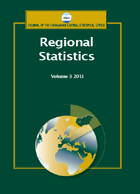Spatial inequalities of disadvantage accumulation and their impact on employability in Hungary
Spatial inequalities of disadvantage accumulation and their impact on employability in Hungary
Author(s): Levente Alpek, Róbert Tésits, Gábor HoványiSubject(s): Social Sciences, Economy, Geography, Regional studies
Published by: Központi Statisztikai Hivatal
Keywords: labour market; jobseekers; disadvantages; multiplication; regional inequalities
Summary/Abstract: The aim of this study is to identify how the individual labour market disadvantages limited employment situation and regional employability of jobseekers in the 2007–2015 economic situation. The target groups of the study are long-term jobseekers, those over the age of 50 years, undereducated, disabled, and young entrants. The study follows a dual approach; on the one hand it presents labour market disadvantages in the group of the most disadvantaged jobseekers living in the disadvantaged areas of Hungary, and the types of interactions through which these contribute to the creation and fixation of unfavourable labour market situation of the affected; on the other hand, by analysing the country as a whole, it examines the spatial aspects of the accumulation of labour market disadvantages and the determining dimensions of the problem (multiple, dominant, and secondary disadvantages) in a territorial approach, on a settlement level. The results of the research dealing with the countrywide survey of unemployment show that individual disadvantages influence the opportunities of jobseekers through various mechanisms. These cumulative effects influence different segments of space in different ways and make the primary labour market (re)integration challenging.
Journal: Regional Statistics
- Issue Year: 8/2018
- Issue No: 01
- Page Range: 96-119
- Page Count: 24
- Language: English

